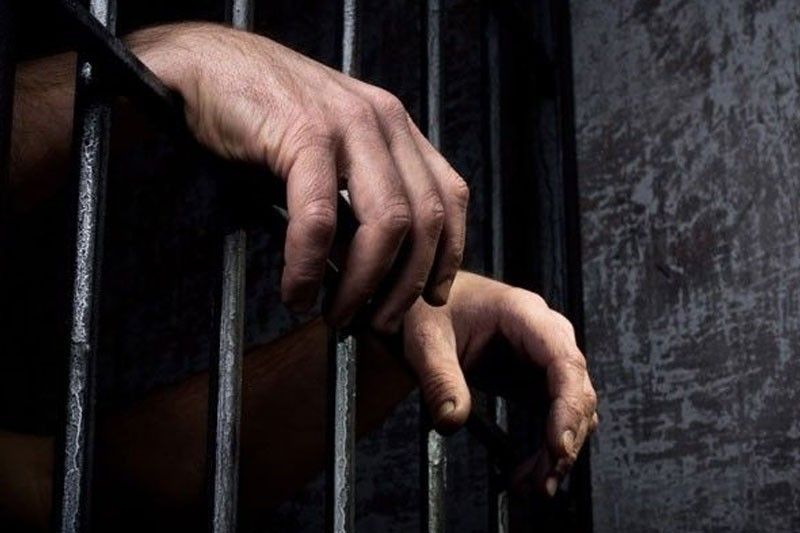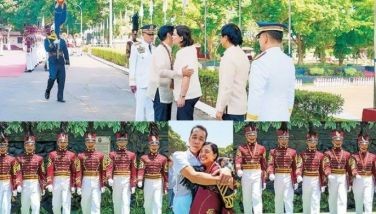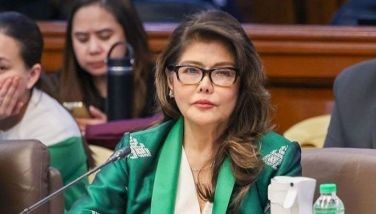‘Send heinous crime convicts back to prison’

BEIJING – Inmates convicted of heinous crimes who were freed under the Good Conduct Time Allowance (GCTA) law should be sent back to prison, presidential spokesman Salvador Panelo said yesterday.
Panelo pointed out that Republic Act 10592, which reduces the prison sentence of inmates who display good behavior, clearly excludes those who are convicted of heinous crimes, escapees, habitual delinquents and recidivists.
“Obviously they should be sent back to jail until they have served the full term of their service,” Panelo said in a press briefing here.
“The President, at the inception of his career as public official, his slogan was and is until now ‘what the law is, just follow it’,” he added.
Panelo said the release of the inmates convicted of heinous crimes is a violation of the law.
The Bureau of Corrections (BuCor) said 1,914 prisoners convicted of heinous crimes have been released because of GCTA since 2014. Sen. Panfilo Lacson has also claimed four convicted Chinese drug traffickers walked free from the New Bilibid Prison (NBP) last June. The four were turned over to the immigration bureau last June 26.
Panelo said the freed inmates may be rearrested because they are not qualified for early release. Rearresting the inmates requires a court order but the presidential spokesman said it would be up to the justice department to handle the issue.
Panelo said it would be up to Congress to decide whether to amend the GCTA, which was signed into law in 2013.
“The wisdom on that amendment of the law lies on Congress. We won’t interfere. We will just implement,” he said.
The GCTA law was placed on the spotlight after the justice department said convicted rapist and murderer Antonio Sanchez may walk free within the next two months due to good behavior. Officials later on clarified Sanchez is not eligible for early release because he was found guilty of a heinous crime.
“The law is very clear: they were not qualified for the expanded GCTA because they were convicted of heinous crimes. Whoever says they were qualified should read the law again,”
Cagayan de Oro City Rep. Rufus Rodriguez said.
Asked if the convicts could be returned to prison, Rodriguez said, “No, they have already been freed. They cannot be arrested again unless they commit a new crime. We hope that they have become good citizens.”
Rodriguez urged Justice Secretary Menardo Guevarra to review the cases of the 1,914 convicts and identify those responsible for their GCTA and subsequent release.
“These personnel should be charged administratively and criminally. Under Section 6 of the GCTA law, a government officer- or employee-offender faces imprisonment of one year, a fine of P100,000 and perpetual disqualification to hold public office,” he said.
Rodriguez said Guevarra should also look into possible corruption in the grant of good conduct allowance and release of prisoners.
The correct view
In the 15th Congress, Rodriguez was among the authors of House Bill 417, which proposed the counting of preventive imprisonment as part of a sentence of an offender if he were convicted.
In the Senate, several bills were filed on the same subject and on the expansion of GCTA provided under the Revised Penal Code.
The Senate consolidated these measures and Bill 417 into Bill 3064, which became the basis of Republic Act No. 10592, otherwise known as the Good Conduct Time Allowance Law.
Senators fuming at the prospect of Sanchez gaining freedom soon due to GCTA are among the authors and endorsers of the law.
The Senate increased good conduct allowance from five days to 15 days under the Revised Penal Code, to 20 days to 30 days per month of proper behavior.
Senators also added additional time deduction for teaching, mentoring or study and for choosing not to escape in the event of a calamity or catastrophe.
Justice Secretary Menardo Guevarra reportedly holds the view that offenders serving time for heinous crimes are not qualified for GCTA, while former undersecretary Reynante Orceo espouses a contrary position.
Orceo was part of a team that drafted the GCTA rules and which the DOJ had adopted.
Rodriguez, a former law dean, said Guevarra’s view “is the correct interpretation of the law.”
“Section 1 of RA 10592 is very clear. It provides, ‘That recidivists, habitual delinquents, escapees and persons charged with heinous crimes are excluded from the coverage of this Act’,” he said.
Rodriguez said although Section 1, which was lifted from Bill 417, is about counting the period of detention of an offender as part of his sentence if he is convicted, “the exclusion clearly applies to both those under trial and those already convicted and serving time in prison, and who apply for GCTA under Section 3 of the law.”
“If those charged with and are being tried for heinous crimes are not qualified for good conduct allowance, the more those already convicted of those offenses should be disqualified,” Rodriguez stressed.
He added that there is no logic in denying GCTA to an offender under trial for murder and giving a generous time deduction to a murder convict in NBP.
Rodriguez urged Guevarra to also review the rules on the grant of good conduct allowance to make them compliant with the law.
Chief Justice Lucas Bersamin said there is no conflict with Supreme Court as to the joint order issued by the DOJ and the Department of the Interior and Local Government (DILG) to suspend the GCTA for 10 days.
The suspension is expected to pave the way for a review by a DOJ-DILG committee on the implementation of GCTA under RA 10592.
Based on the study of the SC, Bersamin said the GCTA should be retroactive, as it will be beneficial to the accused.
However, the issue on the probable release of Sanchez and others came only after a list of convicts who are about to be released came out. That list supposedly included Sanchez.
“When there was an uproar, there is nothing we can do. But our public statement is, ‘it is not within our jurisdiction’,” Bersamin said.
He stressed the jurisdiction lies with the Justice Department and the agencies under it.
“If they want to change the rule, or if they will stick to the law and make some guidelines, that is their privilege, that is their absolute right,” Bersamin said.
Review the law
On the issue of the four Chinese convicts, the Bureau of Immigration (BI) put on hold yesterday their deportation proceedings.
Melvin Mabulac, deputy spokesman and chief of the national operations center of the BI, said they have already directed their deportation unit to hold the implementation of the deportation order of the Chinese convicts.
The DOJ has ordered the BI to stop the deportation proceedings of the Chinese drug traffickers.
Guevarra said the order will remain until they have reviewed the implementing rules and regulations of the GCTA and after the committee has
determined the proper actions concerning persons deprived of liberty.
The order came after
Lacson bared that four Chinese convicted of drug trafficking had been released from the NBP due to the GCTA.
Aaron Aquino, head of the Philippine Drug Enforcement Agency (PDEA), said the released Chinese convicts also sought executive clemency in the past year.
Aquino said three Chinese, two of whom were named by Lacson, had sought executive clemency but their release was objected by the PDEA.
Aquino said that PDEA received a request from the Board of Pardons and Parole to comment on the possible granting of clemency to Pang Ho Wai, as well as Kin San Hu and Wu Hing Sum, who were both named by Lacson.
“Of course because of the gravity of their offense, PDEA interposed objection to grant them clemency,” he said.
Aquino said they did not receive the same request for Chan Chit Yue and Ching Che who were confirmed to be released from the NBP.
According to Aquino, they had objected to the appeal of executive clemency and their release due to the GCTA.
He said their objection to the clemency before the Board of Pardons and Parole should have been taken into consideration by the DOJ and the BuCor.
Aquino said the release of convicted Chinese drug lords was a mockery of the country’s justice system.
He said the GCTA should be reviewed and an investigation should be made to identify those responsible for the release of the Chinese convicts.
“Somehow, as PDEA director general, I feel sad. There is something wrong in the policy of releasing them. Let us go back and try to check the parameters otherwise we are only looking foolish,” Aquino said.
Lacson, for his part, said he will ask the Justice Secretary to explain before Senate Blue Ribbon committee on Monday whether it would be possible to abort the deportation of the Chinese convicts as the DOJ earlier issued.
“The question is, can we still suspend the deportation proceedings and bring them back to Muntinlupa (New Bilibid Prisons) while the DOJ is reviewing the matter?” Lacson said over dzBB.
Lacson said the Chinese convicts may not have to be returned to the NBP but may remain under the custody of the BI until the DOJ decides whether they are covered by the suspension of the implementation of GCTA law.
He said out of the 1,914 convicts released under the GCTA, 48—including the five Chinese – have been convicted of drug-related offenses.
Lacson expressed suspicion that money is the deciding factor for some BuCor officials in reducing a convict’s sentence using the law.
He said he will try to extract the profile of those released under the GCTA if most of them are rich, which could get investigators thinking.
Freed
Among those supposedly released were the three rape-slay convicts of the Chiong sisters in 1997.
In the report by CNN Philippines, it was learned that BuCor chief Nicanor Faeldon signed the release papers of the three convicts earlier this year.
CNN Philippines said they obtained a copy of the release orders signed by Faeldon of Josman Aznar, Alberto Caño and Ariel Balansag for GCTA. The three were among the seven convicted in the 1997 rape-slay of Marijoy and Jacqueline Chiong in Cebu.
The release orders were dated Aug. 16, saying the three have already served 40 years upon the retroactive application of the GCTA under RA 10952.
The STAR yesterday tried to get fresh comments from Faeldon, who earlier denied signing the release papers.
The BuCor earlier said it has released 1,914 prisoners convicted of heinous crimes due to GCTA since 2014.
BuCor legal chief Frederic Anthony Santos, however, refused to comment on reports that Faeldon signed the release order of the three convicts in the rape-slay of the Chiong sisters. Jess Diaz, Paolo Romero, Romina Cabrera, Robertzon Ramirez, Gilbert Bayoran, Ralph Edwin Villanueva
- Latest
- Trending



























